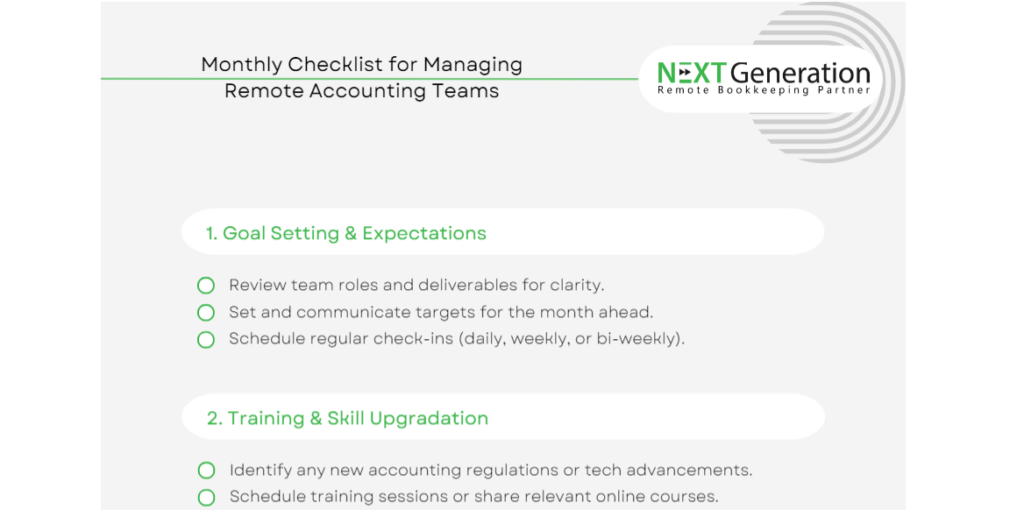Managing a Remote Teams: Accountant's Practical Guide


Emma Todorovska
Marketing, Next Generation Company
25.08.2023
The landscape of accounting has undergone a seismic shift. Gone are the days when accountants were confined to brick-and-mortar offices, pouring over ledgers in solitude.
Today, digital nomadism is sweeping the sector. But, as attractive as it sounds, managing a remote accounting team has its own set of challenges.
How do you ensure collaboration? How do you maintain productivity? If these questions keep you up at night, you’re not alone. We are here to share our insights and guide you through the maze of remote team management. Buckle up!
How Do You Manage a Remote Accounting Team?
Remote working in the realm of accounting isn’t just a temporary trend; it’s becoming the norm. As an accountant, you might be wondering how you can steer your remote team towards success. Here’s a practical guide to assist you in navigating these waters.
Set Clear Expectations
An old adage goes, ‘Clarity is the key to effective leadership.’ And in the realm of managing a remote accounting team, this principle holds strong. Avoiding assumptions and ensuring everyone is on the same page is the cornerstone of effective team management.
◾Roles & Deliverables:
Each team member should know their role inside out. What are they responsible for? By when? Defining these prevents confusion and overlaps.
◾Regular Check-ins:
Think of these as your compass. They ensure everyone is headed in the right direction. Whether it’s daily, weekly, or bi-weekly, find what rhythm suits your team.
Ready to streamline your team’s dynamics? Move on to the tools that can make your life easier.

Embrace the Right Tools
The digital age brings along a myriad of tools designed to make remote work smooth. But remember, it’s not about quantity; it’s about quality. Here are tools you shouldn’t be without:
Communication:
- Slack, Microsoft Teams, and Zoom are staples. Regular chats and video calls replicate the office environment, keeping everyone in sync.
Managing Tasks & Deadlines:
Foster Trust and Independence
Remote work can feel like uncharted territory for many managers. The fear of reduced productivity can be overwhelming. But here’s the secret – trust is the foundation.
Trust in Practice:
Resist the urge to micromanage. Trust that your team knows what they’re doing. Believe in their expertise and let them take ownership.

Encouraging Discipline:
While trust is crucial, cultivating a culture of self-discipline and responsibility ensures that the team remains productive and meets their targets.
Are you finding this useful? There’s more to explore in best practices, so don’t stop here!
What Are the Best Practices When Managing Remote Teams?
When the terrain is unknown, it’s best to have a map in hand. Managing remote teams, especially in the intricate field of accounting, requires adherence to certain practices. Here’s what you need to put on your checklist.
Regular Training and Skill Upgradation
Accounting isn’t stagnant. With evolving regulations and tech advancements, continuous learning becomes paramount.
Staying Updated:
Ensure your team isn’t left behind. From new tax regulations to the latest in accounting software, periodic training is crucial.
Virtual Training Tools:
Platforms like Coursera, Udemy, and LinkedIn Learning offer specialized courses. Incorporate these into your training regimen and watch your team’s proficiency soar.
Are you curious about how to ensure seamless communication remotely? Here’s the secret sauce.
Encouraging Discipline:
While trust is crucial, cultivating a culture of self-discipline and responsibility ensures that the team remains productive and meets their targets.
Are you finding this useful? There’s more to explore in best practices, so don’t stop here!
Create a Culture of Open Communication
In a remote setup, communication isn’t just speaking; it’s about ensuring understanding.
Feeling Connected:
Foster a virtual environment where team members feel they’re a part of something bigger. Regular team meetings, brainstorming sessions, or even casual catch-ups can make a world of difference.
Feedback Loop:
Constructive feedback is growth fuel. Ensure there’s a system in place where team members can voice their concerns, give suggestions, and also receive feedback.
Wondering about the human touch in remote setups? It’s all about balance.
Schedule Periodic Face-to-Face Interactions
While digital tools bridge many gaps, the essence of human connection is irreplaceable.
Virtual Team Meetups:
These are not just about work. Engage in team-building activities, celebrate milestones, or even share a virtual coffee break.
Physical Meetups:
If possible, plan for an annual or semi-annual meetup. It can be a team retreat, a workshop, or just a gathering. The human touch fosters loyalty and understanding.
Feeling overwhelmed? Don’t be. The journey of managing people remotely is filled with learning, and we’re here to guide you through.
How Do You Effectively Manage People Remotely?
Navigating the challenges of remote management can be a steep curve, especially when it comes to the human element. Let’s delve into some strategies that ensure your team remains motivated, connected, and productive.
Prioritize Well-being and Mental Health
The four walls of one’s home can sometimes feel limiting, and it’s essential to recognize the signs.
Spotting Burnout:
Keep an eye out for signs of exhaustion or disinterest. Is a usually punctual team member suddenly missing deadlines? Address it with empathy.
Encouraging Off-Hours:
Just because you’re home doesn’t mean you’re always “on.” Ensure team members know the value of breaks and setting boundaries.
How do you ensure your team feels seen and appreciated? Recognition is the key.

Recognize and Reward Efforts
Appreciation in a remote setting is not just good-to-have; it’s essential.
Virtual Applause:
Celebrate the small wins. Acknowledge a job well done, even if it’s just on a group chat or an email.
Reward Mechanisms:
Consider setting up reward systems, perhaps a ‘Remote Star of the Month’ or bonuses for exceptional performances. Recognition is a morale booster.
Do you want to foster even stronger bonds? Effective collaboration is the way forward.
How Do We Effectively Collaborate with Remote and Distributed Teams?
Collaboration is the secret ingredient that can make or break a remote team. When team members are spread across cities, countries, or even continents, fostering collaboration requires strategy, tools, and a dash of creativity.
Time Zone Management
Let’s face it, scheduling a team call can sometimes feel like a puzzle.
Scheduling Considerations:
Be aware of the various time zones your team members are in. Opt for timings that are as convenient as possible for the majority, and rotate when necessary.
Tools to the Rescue:
Platforms like World Time Buddy or Every Time Zone can be lifesavers, helping you plan meetings without the usual time zone headaches.
How do you ensure everyone’s on the same page, literally? Let’s talk about collaborative workspaces.
Collaborative Workspaces
In the age of the internet, distance should never be a barrier to teamwork.
Shared Documents:
Tools like Google Workspace or Microsoft Teams allow multiple individuals to work on a document simultaneously, bringing collective minds together.
Interactive Platforms:
Consider platforms like Miro or MURAL for brainstorming sessions. They serve as virtual whiteboards, letting your team collaborate in real time.
Collaboration isn’t just about tasks. It’s about creating an environment where team members feel valued, heard, and connected. Remember, as the saying goes, “Alone we can do so little; together we can do so much.”
Conclusion
The age of remote work in accounting is here, and with it comes challenges intertwined with immense opportunities. As a manager or practice owner, you have the unique position to set the tone, ensuring that despite physical distances, your team remains cohesive, motivated, and high-performing.
Remember, tools are just enablers; the real magic lies in understanding the human element of your team, addressing their concerns, celebrating their achievements, and leading with empathy and foresight. The digital landscape offers endless possibilities, but it’s the heart-to-heart connection that truly makes a remote team shine.
Embrace more than just the changes; excel in the age of remote operations. Each hurdle you encounter shapes a workspace where the focus isn’t solely on digits but on individuals, progress, and mutual achievements. Are you eager to elevate your remote team management? Below, download our Monthly Checklist and benefit from:
- Staying on track with clear goal setting.
- Prioritizing team well-being and mental health.
- Ensuring effective and harmonious collaboration.
- Recognizing and rewarding standout performances.
Take the step to drive success each month with these actionable pointers.
Monthly Checklist


Masterclass with Josh Greenbaum
Transform Your Advisory Skills Watch Josh Greenbaum’s Masterclass Now! Missed the live session? Don’t miss out on the insights! Get exclusive access to Josh Greenbaum’s

Inspiring Success in the Accounting World: Viviane Hagopian
Inspiring Success in the Accounting World Viviane Hagopian Emma TodorovskaMarketing Manager at Next Generation CompanyOctober 2023 Linkedin-in In this inspiring interview, we delve into the

Managing a Remote Teams: Accountant’s Practical Guide
Managing a Remote Teams: Accountant’s Practical Guide Emma TodorovskaMarketing, Next Generation Company25.08.2023 Facebook-f Linkedin-in The landscape of accounting has undergone a seismic shift. Gone are

Accounting Practice Management Software: The Top 10 Picks
Accounting Practice Management Software: The Top 10 Picks Emma TodorovskaMarketing Manager at Next Generation CompanyAugust 2023 Linkedin-in In today’s digital age, staying at the top

Inspiring Success in the Accounting World Shauna A. Wekherlien
Inspiring Success in the Accounting World Shauna A. Wekherlien Emma Todorovska Marketing Manager at Next Generation Company June 2023 Linkedin-in Dive into the dynamic and

Inspiring Success in the Accounting World: Krista Sievers
Inspiring Success in the Accounting World Krista Sievers Emma TodorovskaMarketing Manager at Next Generation CompanyJune 2023 Linkedin-in Our guest today is Krista Sievers, the proud
